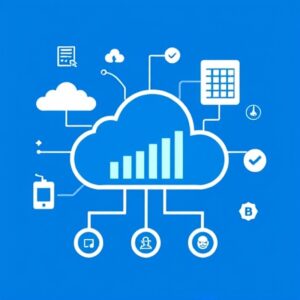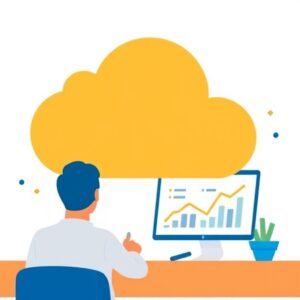Did you know that 80% of small businesses fail because of bad decisions? Often, this is because they lack data-driven insights. Pivot BI Analytics LLC can help. We give small businesses the tools they need to make smart choices without spending a lot on upfront payments.
Analytics is key for small businesses to grow and stay competitive. Cloud-Based Analytics is great because it’s flexible and affordable. It’s perfect for small businesses looking to improve their analytics game.
Key Takeaways
- Cloud-Based Analytics provides small businesses with affordable analytics solutions
- Small Business Analytics is crucial for driving growth and competitiveness
- Cloud-Based Analytics offers scalability and cost-effectiveness
- Advanced analytics capabilities are accessible without significant upfront investments
- Cloud-Based Analytics helps small businesses make informed decisions
- Small businesses can enhance their analytics capabilities with Cloud-Based Analytics

Introduction to Cloud-Based Analytics
Exploring cloud-based analytics is key for small businesses. It’s about understanding the basics and its role in decision-making. Cloud data analysis and business intelligence tools are vital for growth.
What is Cloud-Based Analytics?
Cloud-based analytics uses cloud computing and SaaS to deliver analytics over the internet. It lets small businesses use advanced tools without needing big IT setups.
Importance for Small Businesses
Cloud-based analytics is crucial for small businesses. It gives real-time insights into customer behavior and market trends. This helps small businesses make better decisions and grow.
Some benefits include:
- Access to advanced analytics tools without big costs
- Scalability for growing businesses
- Improved team collaboration and data sharing
Using cloud data analysis and business intelligence tools, small businesses can stay ahead and succeed in the long run.
Key Benefits of Cloud-Based Analytics
Cloud-based analytics offers many advantages, but one big one is its cost-effectiveness. It saves small businesses money by not needing to buy expensive hardware and software upfront. This is what Cost-Effective Analytics is all about, helping businesses use their money better.
Another big plus is its scalability. As businesses grow, their analytics needs change. Cloud-based solutions can grow or shrink to fit these changes. This is super helpful for small businesses that grow or change a lot. With Cloud-Based Reporting, making and sharing reports is fast and easy, helping businesses make better choices.
Cost-Effective Solutions
Some of the main cost-saving features of cloud-based analytics include:
- Reduced upfront costs
- Lower maintenance and support costs
- Increased scalability and flexibility
Scalability for Growth
Cloud-based analytics solutions help businesses grow, with features like:
- Easy scalability to meet changing demands
- Fast deployment and implementation
- Real-time data insights and reporting
By using these benefits, small businesses can make smarter choices, grow, and stay ahead in their markets. Cloud-based analytics lets businesses focus on what’s most important – giving value to customers and achieving success.
Top Cloud-Based Analytics Tools for Small Businesses
We’ve found top cloud-based analytics tools for small businesses. These tools help make data-driven decisions. They offer Data Visualization Software and SMB Data Analytics, allowing businesses to collect, analyze, and visualize data.
Some leading cloud-based analytics tools include:
- Google Analytics for web analytics
- Microsoft Power BI for business analytics
- Tableau Online for data visualization
- Zoho Analytics for comprehensive business intelligence
These tools have many features like data visualization, reporting, and predictive analytics. Small businesses can get insights into customer behavior, sales, and operations. This helps drive growth and improvement.
When picking a cloud-based analytics tool, consider scalability, security, and ease of use. The right tool can unlock your data’s full potential. This way, small businesses can make informed decisions for success.
| Tool | Features | Pricing |
|---|---|---|
| Google Analytics | Web analytics, data visualization | Free – $150,000/year |
| Microsoft Power BI | Business analytics, reporting | $10 – $20/user/month |
| Tableau Online | Data visualization, predictive analytics | $35 – $70/user/month |
| Zoho Analytics | Comprehensive business intelligence | $25 – $125/user/month |
How to Choose the Right Cloud Analytics Tool
Choosing the right cloud analytics tool for your small business is key. We must first understand our business needs. This means figuring out what insights we need from our data and what features are crucial for our operations. This helps us focus on the right tool for our goals.
When picking a cloud analytics tool, consider a few important factors. These include:
- Scalability and flexibility in pricing models
- Ease of use and user interface
- Integration capabilities with existing systems
- Level of customer support provided by the vendor
By looking at these factors, we can pick a tool that fits our unique needs. Cloud-Based Analytics offers valuable insights for small businesses. Small Business Analytics helps us make informed decisions based on data.
The ideal cloud analytics tool varies based on our business needs and goals. By researching and comparing different tools, we can find one that supports our growth.
| Cloud Analytics Tool | Pricing Model | Features |
|---|---|---|
| Google Analytics | Free and paid plans | Web analytics, tracking, and reporting |
| Microsoft Power BI | Free trial, then paid plans | Business analytics, data visualization, and reporting |
Getting Started with Cloud Analytics
Starting our cloud analytics journey is exciting. First, we need to set clear goals. What do we want to achieve? Maybe we want to better engage customers, streamline operations, or boost sales. With Affordable Analytics Solutions, we can make smart choices based on data.
Then, we figure out how to collect data. We decide what data to gather, how to get it, and how to keep it reliable. This might mean using web analytics tools, linking with CRM systems, or adding tracking codes to our site. Good Cloud Data Analysis is key here, helping us find important insights in our data.
- Define your analytics goals and objectives
- Choose the right cloud analytics tool for your business
- Develop a data collection strategy
- Ensure data quality and integrity
By taking these steps and using Affordable Analytics Solutions and Cloud Data Analysis, we’re ready for success. We’ll help our business grow and get better.
| Step | Description |
|---|---|
| 1. Identify Goals | Determine what you want to achieve through analytics |
| 2. Develop Data Collection Strategy | Decide what data to collect, how to collect it, and how to ensure its quality and integrity |
Common Challenges Small Businesses Face
Small businesses using cloud-based analytics often face challenges. Two big ones are data security worries and getting users to adopt new tools. These issues can make analytics less effective.
Choosing Business Intelligence Tools that focus on data security is key. Cost-Effective Analytics options help small businesses stay safe without spending too much.

Data Security Concerns
Data security is a big worry for small businesses. They need to keep their data safe from hackers and other threats. To do this, they can use strong security like encryption and access controls.
User Adoption Issues
Getting employees to use new analytics tools can be tough. They might not want to or know how to use them. Training and support can help make them more comfortable and proficient.
Here are some ways to tackle these problems:
- Invest in Business Intelligence Tools that are easy to use.
- Keep training and support going for your team.
- Use strong security to protect your data.
Best Practices for Effective Cloud Analytics Usage
Small businesses can get the most out of cloud analytics by following some key steps. One important thing is to keep an eye on data insights. This lets businesses quickly react to changes in their market, customer behavior, or how they operate. Tools like cloud-based reporting help make decisions based on data.
It’s also crucial to keep learning. Analytics is always changing, with new tools and methods coming out all the time. By keeping up with the latest in data visualization software, businesses can improve their analytics skills and stay ahead. Some good practices include:
- Regularly reviewing and updating analytics strategies
- Staying informed about the latest industry trends and technologies
- Investing in employee training and development
By following these best practices and using cloud analytics tools, small businesses can fully use their data. This can help them grow.
Integrating Cloud Analytics with Other Tools
Exploring Cloud-Based Analytics shows its value when paired with other business tools. For small businesses, linking it with CRM systems and marketing automation is key. This combo offers a deep dive into customer habits and preferences. It helps in crafting targeted marketing and enhancing customer service.
Connecting Cloud-Based Analytics with CRM systems sheds light on what customers like and do. This info fuels personalized marketing efforts, boosting engagement and loyalty. Also, pairing it with marketing automation software makes campaigns more effective and data-driven.
Integrating Cloud-Based Analytics with other tools brings several benefits:
- Enhanced customer insights
- Improved marketing campaign effectiveness
- Increased efficiency in data analysis and reporting
Small Business Analytics thrive on these integrations. They offer a complete view of operations and customers. This leads to better decision-making and strategic planning. By using Cloud-Based Analytics with other tools, small businesses can stay ahead and grow.
Real-World Success Stories
Many small businesses have seen big wins by using cloud-based analytics. They’ve used affordable analytics solutions and cloud data analysis to understand their operations better. This has helped them engage with customers more effectively and grow their revenue.
Some businesses have boosted their marketing efforts with cloud analytics. For example, a small e-commerce site saw its sales jump by 25%. This was thanks to a cloud analytics tool that gave them real-time insights into customer behavior.
Small Business Case Studies
These case studies show how cloud analytics can help businesses grow. Small businesses can spot areas for improvement and make smart decisions with cloud data analysis. This leads to growth.
Measurable Impact on Growth

Cloud analytics has brought real benefits to small businesses. They’ve seen more revenue, happier customers, and better competition. The table below shows the clear advantages of using cloud analytics:
| Benefit | Description |
|---|---|
| Increased Revenue | Cloud analytics helps small businesses run better and engage customers more. This leads to more sales. |
| Improved Customer Satisfaction | With cloud data, businesses can understand what customers want. This helps them serve better and keep customers happy. |
| Enhanced Competitiveness | Affordable analytics solutions and cloud data help small businesses make smart choices. They stay ahead and reach their goals. |
Future Trends in Cloud-Based Analytics
We’re looking forward to the future of cloud-based analytics. It’s going to change the industry in big ways. AI and machine learning will make analytics tools smarter, allowing for deeper analysis and predictions. This will help small businesses get cost-effective analytics they couldn’t afford before.
As business intelligence tools get better, they’ll offer cool new features. Predictive analytics will let small businesses forecast and plan ahead. This will help them stay competitive and make smart, data-driven choices.
AI and Machine Learning Integration
AI and machine learning will make cloud analytics tools super powerful. Small businesses will be able to quickly and accurately analyze big data. This will give them insights to inform their decisions and grow their business.
Predictive Analytics for Small Businesses
Predictive analytics will become easier for small businesses to use. They’ll be able to predict the future and make smart plans. This will help them stay ahead of the competition and make informed decisions.
With business intelligence tools and cost-effective analytics, small businesses can make choices based on data. We think the future of cloud analytics is bright. We’re here to help small businesses navigate this exciting new world.

Conclusion and Action Steps for Small Businesses
Cloud-based analytics is a game-changer for small businesses. It lets them get deep insights and grow. With the cloud, they can use top-notchsmall business analytics without spending a lot upfront.
Start youranalytics journey now. Pick a cloud-based analytics tool that fits your business needs. Set up how you’ll collect data, know what you want to achieve, and keep learning to get the most from youraffordable analytics solutions.
Success isn’t always easy. Be ready to face challenges, learn from mistakes, and keep improving. With cloud-based analytics, your small business can reach new levels of success, efficiency, and innovation.
The future looks bright for small businesses usingcloud-based analytics. Begin your journey to data-driven success today. The insights and edge you gain will help your business soar.

